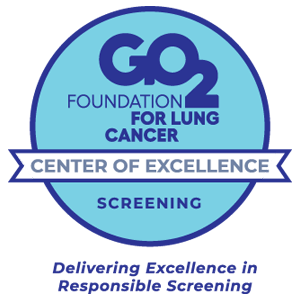 Riverside Health has been named a Screening Center of Excellence by the GO2 Foundation for Lung Cancer for its
ongoing commitment to responsible lung cancer screening.
Riverside Health has been named a Screening Center of Excellence by the GO2 Foundation for Lung Cancer for its
ongoing commitment to responsible lung cancer screening.
“Riverside is dedicated to providing patients with the highest quality care,” said Vikas Pathak, M.D., of Riverside Pulmonary & Sleep Specialists. “This designation showcases that we have the resources available and the skilled clinicians ready to care for patients at risk for lung cancer. We are thrilled to be part of this elite group of designated centers, setting an example for responsible screening practices across the country.”
Low dose CT screening for lung cancer carried out safely, efficiently and equitably can save tens of thousands of lives a year by finding lung cancer early when it is most treatable and even curable.
“We are proud and honored to be working with Riverside as a GO2 Foundation for Lung Cancer Screening Center of Excellence. Their commitment to practice responsible lung cancer screening will lead to advancements in research and many lives saved. They are an example to follow,” said GO2 Foundation Co-Founder, President and CEO, Laurie Fenton Ambrose.
Designated Screening Centers of Excellence are committed to providing clear information on who is a candidate for lung cancer screening based on current evidence and to comply with comprehensive standards reflecting best practices developed by professional bodies such as the American College of Radiology (ACR), the National Comprehensive Cancer Network (NCCN) and the International Early Lung Cancer Action Program (I-ELCAP).
Through established guidelines for controlling screening quality, radiation dose and diagnostic procedures within an experienced, multi-disciplinary clinical setting, Screening Centers of Excellence ensure that lung cancer screening’s life-saving benefit transforms lung cancer care in their local community.
While the lung cancer screening is not meant for all patients, it is used for patients who are considered high risk, Pathak said.
“Any patient who has smoked one pack per day for 30 years or more, and is above 55 years of age, is still smoking or quit in the last 15 years, could qualify for lung cancer screening,” Pathak said. “The goal of the screenings is to help identify the cancer at its earliest stages.”
The percentage of patients identified in Riverside screenings is on par with national trends, Pathak said, or about 1.8% of those screened.
“With the screenings, we look for pulmonary nodules, or as patients say, a spot in the lung,” Pathak said. “If we do identify spots in the lung, we then offer further diagnostic testing” that can range from additional low dose CT scans, biopsies or surgery.
In 2019, Pathak said, Riverside screened nearly 1,800 patients.
The screenings are just one part of the effort to help prevent, identify and treat lung cancer.
“We also need to help people quit smoking,” Pathak said. “We focus on how to quit smoking, too. We understand that it can be very difficult for people to quit smoking and offer preventative steps and resources to help.” Pathak’s advice for quitting?
“Do not seek help from your peers or rely on vaping or electronic cigarettes,” Pathak said. “Seek help from your primary care provider.”
To schedule an appointment or to learn more about lung cancer screenings, call Riverside's Lung Screening Coordinator at 757-534-LUNG. Screenings are available in Newport News, Williamsburg, Hampton, Smithfield, Gloucester, Tappahannock and Onancock on the Eastern Shore.
About GO2 Foundation for Lung Cancer
Founded by patients and survivors, GO2 Foundation for Lung Cancer transforms survivorship as the world’s leading organization dedicated to saving, extending, and improving the lives of those vulnerable, at risk, and diagnosed with lung cancer. GO2 Foundation works to change the reality of living with lung cancer by ending stigma, increasing public and private research funding, and ensuring access to care.
Published: June 25, 2020
